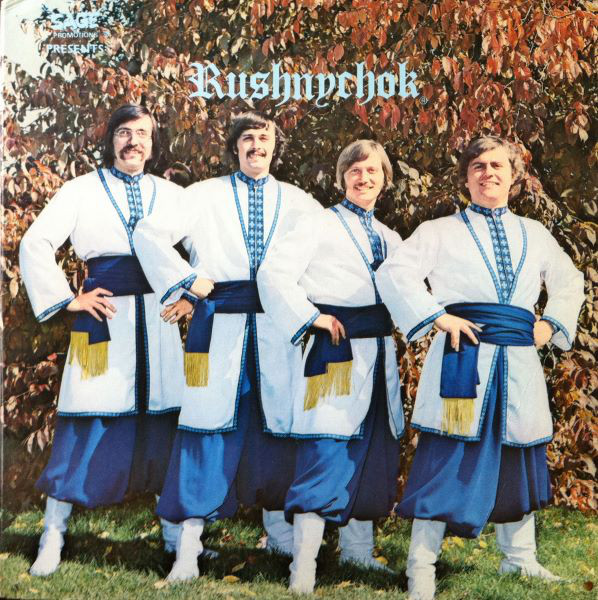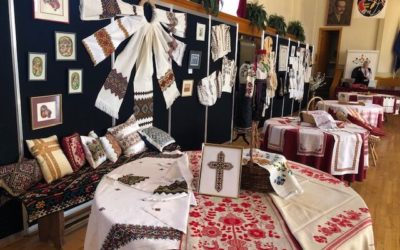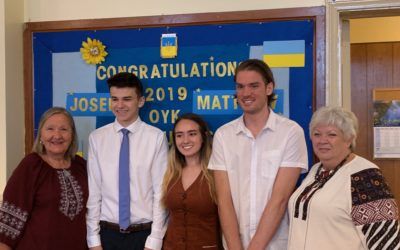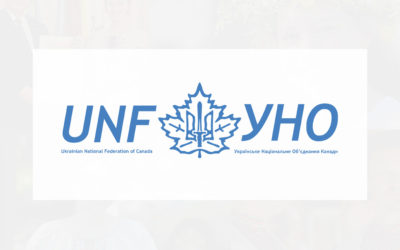By Stefan Andrusiak
Rushnychok met for the first time in 1969 at the intersection of Fairmount and Hutchison streets in Montreal. The Ukrainian National Federation hall is still a stately landmark on the northeast corner. From that starting point, Rushnychok would travel to where old-world memories intersected with the demands of a new generation. It was at a time when fierce loyalties forged by the hammer of loss on the anvil of war encountered a flower waving youth searching for love and peace. Our success would lie in appealing to both sets of travelers, and dancing them across the divide.
My father: Mykola had invested with fourteen others to build a Montreal restaurant and reception hall called La Steppe. He asked me one fall day if I would ask some of my friends to play at La Steppe’s inaugural New Year’s party.
I played drums at weddings with Andriy Harasymowycz on guitar, and his older brother Youra. Occasionally my friend Yourko Sztyk would also sit in. Yourko was intent on courting their sister Oksana. He would play in our little band on off-date nights. Then one night, Youra announced he would be stowing his accordion to study dentistry.
I had heard that Ewhen Osidacz played accordion, and that he had a beautiful tenor. Ewhen was president of our university student arts association at Loyola. One noon hour friends were playing broom ball over at the sports complex, and I knew that Ewhen was their goalie. I watched him from the stands. After the game I introduced myself and made my pitch. A week or so later four of us arrived at the UNF hall at the agreed upon hour.
We all remember playing that New Year’s Eve. As night approached morning, the crowd wouldn’t leave. The hall manager: Mr. Petrashko at first motioned to extend our sets. The applause seemed unending. Ewhen remembers having exhausted our songs, and repeating them, adding: “I don’t think anyone noticed.” The revelers cheered: “More, more, more!” No one wanted it to end. Finally, Mr. Petrashko turned off the electricity to our amplifiers. That night, as 1969 welcomed the next decade, we sensed that we would play again soon and often.
Rushnychok wasn’t the first band to be called the Ukrainian Beatles. In 1965 the D-Drifters produced an album, which included Ukrainian language covers of songs from the British music invasion. The Lennon-McCartney early composition Please, Please Me and a ballad called From Me to You were both on the Winnipeg band’s album: The D-Drifters 5 Sing and Play Beatles Songs…
Back then, any male adolescent with long hair could incur the good-natured greeting: “hey Beatles. ”My mother would regularly call me (бітелс) “beat-else.” One morning after I had repeatedly refused to get a haircut, she snuck up on me with her sewing scissors. While I slept, she cut an enormous handful of my locks with no particular styling plan. I awoke to see her beaming. Grabbing a hat, I walked to the barbershop.
In those days “zabava” bands wore white shirts and suits on stage. They sat and played from music sheets, delivered old standards, and pretty much kept to themselves. Our fans associated us with the Beatles because like the fab four, we played our own compositions. We wore tailor made Ukrainian themed attire. We projected a unified look. When we played traditional songs, we delivered them in three-part harmony and injected them with new rhythms and rock overtones. Our repertoire enthusiastically embraced traditional sentiments and contemporary life here and now. Here in Ukrainian, now in the 1970s, like the Beatles we were game-changers.
Zenon Snylyk, was a famous member of the U.S. Olympics soccer team in his youth, and later became the long-serving editor of the Ukrainian Weekly: Svoboda. It was at the Ukrainian National Association’s Catskill Mountains estate: Soyuzivka that he proclaimed Rushnychok to be “a happening.” Ukrainians from all over America and Canada came to soak in the sun, to dance beneath the stars and to live the Ukrainian experience.
Rushnychok of course would source and showcase many beloved Ukrainian traditional ballads as well. There were songs about love lost (“Кого любила тяшко забути”) or about a mother’s advice to her love-struck daughter (“сама такая була”).
Also, at the core of our repertoire stood songs of valiant fighters for Ukraine’s freedom. An Evening in May (Маєва Нічка) was a tender lullaby dedicated to the Січові Стрільці: the Ukrainian Riflemen, who fought in the First World War and on other fronts; among them, Yourko’s father: Frans Josef. Another was the ballad of Yuri Tjutjunnyk, which was a centrepiece in the Ukrainian Bandurist Chorus’ magnificent concerts.
Andrij, Ewhen and Yourko, individually and in combination, wrote a dozen original songs. Theirs’ were loving and sensual lyrics at a time when traditional mores masked feelings of more intimate affection (“Зрозуміть не можу досі”), or made fun, as every culture does, of the bonds of matrimony (“Оженився, ой біда!”).
Yourko Sztyk remembers that “throughout our musical career, we were blessed with many good friends and people, who wanted to help. One such person was Borys Budny. He is an accomplished playwright, as well as a poet. From time to time, Borys would send us some of his poems, and any one of us would try to put them to music. A number of these collaborations worked out very well, and resulted in memorable songs”, says Yourko.
Here’s why I believe each one is memorable.
1. We spoke our truth to power: demanding human rights in what was then the USSR. The Beatles were asserting: “don’t know how lucky you are boy, back in the USSR. ”Rushnychok countered with (Воля Україні) Freedom for Ukraine. It alerted the world that some of those “boys,” were not at all lucky. Men and women “back in the USSR” were banished to die in the Gulag. “I think it important to mention … our belief in a democratic Ukraine. Some of our songs were prophetic in declaring Ukraine would be free,” says Ewhen.
2. Любімся – Lets Get Together was a direct call for Ukrainians to set aside past differences. We summoned listeners to embrace, unite and to (братайтися) befriend each other. Where resolution is peaceful, there too will exist contentment (бо як мирно полагодить то і гаразд буде).This kind of call to action on a contemporary need was unheard of in Ukrainian music. Let’s Get Together was our John Lennon-like “Come Together” and “Imagine” all rolled into one. It also became our anthem, and we would close every performance with the crowd standing, watching, and singing along.
3. Andrij and Larissa had been childhood sweethearts. Now all grown up, Andrij penned a love letter to her, and we recorded it: Моя Кохана – My Loved One on our first album. “I’ll give you all that your (серденько бажає) heart desires.
4. Burya is a song that may have inspired another popular band’s name. It’s about a man lying in the arms of his lover telling her that the storm may be raging outside but (не ма бурї в почутях моїх) there is no such “burya” lying in your embrace. I can’t think of any Ukrainian song from that time where lovers were horizontal.
5. The temperature was really turned up in the Borys Budny/Andrij Harasymowycz love song: You – Ти. I once thought that I would never love again. That was before I looked into your eyes. Now I see love there and feel the heat of your lips. I ignite at your touch. My blood boils as you arrive. (Кіпить кров твоїм приходом.) Sensuous and loving; the dance climaxes with a double-entendre that leaves listeners wondering, “did they really just say that?
6. Yourko Sztyk wrote both the words and the music to Lytsar – Лицар six years before Don Henley and the Eagles recorded a similar story line for their hit New Kid In Town. Lytsar, which is loosely translated as a White Knight, comes on the scene and the girl Yourko loves is distracted (про другого мріяла). The singer is dismissed as a parade of admirers pursues the new arrival. This kind of heartbreak is timeless.“
One of the most rewarding aspects of being a member of Rushnychok was the open-mindedness of the other members when it came to trying new songs, says Yourko Sztyk. “Andrij, Ewhen and I would occasionally present a new song to the group, one that we had recently composed. We always received a positive reaction, helpful hints to improve it, and assurances that it would be included in the next album. This encouraged our creativity and resulted in some memorable songs,” recalls Yourko.
7. Should I go or should I listen to my heart and stay? It’s a question that crosses cultural boundaries and genders, and it is the question asked by Borys Budny and Ewhen Osidacz in a hot tango called Listen To My Heart – Чи Прислухатимеся До Серця Мого?
8. Borys with Yourko co-wrote a cheeky tango called Don’t Blame Me – Не Винуй Мене. It was our homage to composer-musician Bohdan Wesolowsky, whose music had ignited Lviv’s pre-war tango tinged nightlife. “You can blame the towering mountains, the stormy sea, the thorny rose. Blame them all for my falling in love with you, but don’t blame me.”
9. Your Winter’s Love – Твоя Любов Зайшла Зимою was a Budny-Osidacz composition about birds flying away as love also cools and goes south too.
10. Yourko and Ewhen collaborated on My Homeland – Землие Моя, which gives voice to immigrants everywhere, who long for their homeland, while acknowledging how privileged they are to be living in the land that has so generously accepted them.
11. Speaking of Ukraine, Ewhen wrote a melody to one of Taras Shevchenko poems. The song only lasts a concise one minute and twenty-two seconds, but it offers a whole new way to deliver Shevchenko: Ukraine’s most beloved son. Учітися Ьрати Мої – Learn Well, My Brothers. Ukrainians have grown up with that advice. Learn from others. Know yourselves, and never ever turn away from who you are. Our audiences were dancing to Shevchenko’s caution while singing along to his words.
12. Many early Ukrainian settlers were driven by discrimination to change their names to something shorter or more palatable to the Anglo-Saxon ear. Borys and Yourko wrote Reflections – Я Мабуть Колись Тут Був to situate the singer in a place in his past. There he recalls what he gave up in exchange for compliance and acceptance. “We spoke through our performances … to several generations of North Americans and reawakened an awareness, pride, and realization of their Ukrainian roots and ethnicity,” says Ewhen. We helped make them “aware of the fact that they are part of a noble and historic national entity. The Ukrainian people were “subjected to centuries of Russian domination. … Many of that era retain fond memories of their personal Rushnychok experiences.” … They realized, “that their heritage is wholesome and worthy of recognition” says Ewhen.
This is true “not only in North America. Through our recordings, this awareness extended to Europe and to the motherland of Ukraine,” he adds. There are “numerous testimonials even 40 years later of inspiring stories by current residents of Ukraine that attest to the fact that they found inspiration, knowing that in North America there were Ukrainians that not only retained a patriotic yearning; but that strived for what they aspired to, which was a revolution of change; an assertion of a rebirth of national identity; a pride of a people. … although started, (this) is still developing. Rushnychok remains part of that,” Ewhen concludes.
…
On Canada Day, July 1st, 1988 the Contemporary Ukrainian Music Awards, held in Edmonton, organizers recognized Rushnychok. Two achievement awards celebrated the quartet’s contribution to the Ukrainian recording industry.
In September of 2008, on-stage at the Montreal Ukrainian Festival each of us received a “hramota” plaque for our disciplined “подвижницьку” work to maintain the good name of our nation.
Then in 2015 the Father Jean (scholarships) Foundation honoured Rushnychok at its annual dinner “for services rendered to the Montreal Ukrainian community.”
Through the years, friends and fellow travelers have richly rewarded each of us with reminiscences, quiet thanks and smiles.
There have been other occasional mentions of Rushnychok as far away as Ukraine itself. Last year, the regional “gazetta” Volyn (Волень) compared Rushnychok to the Beatles “Бітлз”, one last time. Three days later we would be whole no more. Andrij Harasymowycz died June 26th, 2019.
“Although he is gone now, he was, in many ways, the heart and soul of Rushnychok,” says Yourko. “Andrij was born to sing and perform, and was never happier than when he was on stage, in front of a crowd, doing what he did best. He knew the songs, knew how to perform them and knew how to make sure we understood their true meaning. We all miss him and his unique kindness, gentleness, but most of all, his passion for everything Ukrainian”, Yourko says.
“We can speak of the various performances throughout North America: the festivals, the private events and the numerous pro bono appearances that we staged for no other reason than the fact that we believed in the importance of being there,” says Ewhen.
This year, “we were on the cusp of being recognized by the people of Ukraine for our contribution; however the pandemic has put that on hold,” Ewhen adds. Indeed this October Ewhen, Yourko and I were to have flown to Lviv, Ukraine for two tribute concerts. Some of Ukraine’s most popular artists were to have staged Rushnychok’s 12 original songs, adding their own star-power and interpretation. It would have been a significant closing of the circle.
Our parents brought their dreams from Ukraine. We were four 20-somethings, bursting at the seams with enthusiasm for the threads they had handed down to us. They each gave us good council once the band launched, and each parent in his or her own way had our backs. When challenges arose, they responded with love.
It was on a bitterly cold winter’s day that our first shipment of Rushnychok albums arrived on a pallet at Ewhen’s parents’ home. Neither he nor we were there to help unload them. The driver would only agree to place them where his truck met the curb. So Ewhen’s mother carried our albums: 25 to a box, into the garage, where they could stay pristine and dry.
Vinyl records are a curiosity these days. No longer are they loaded in great numbers onto pallets and delivered by truck. Music downloads are weightless and wait-less; virtual and instant. Today, Ukrainian artists sing in a multitude of languages and in genres as diverse as opera (Pavlo Hunka), classical (Carissa Klopoushak), choral (Hoosli), rock (Mad Heads), blues (Darka Stebilka), punk (TNMK), electro folk (ONUKA), reggae (Auresia) and zabava (Zirka). They are all representative:the best of the best. We are proud to have been there once ourselves.
Stefan Andrusiak is reporter and host of Nasha Kasha- a Ukrainian Almanac and a member of Rushnychok



